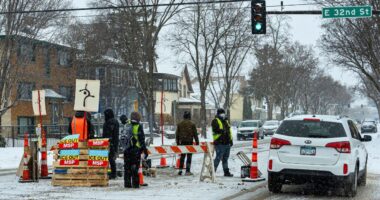Share this @internewscast.com

Authorities have arrested nine individuals connected to a Long Island gang affiliated with the Bloods, revealing a web of violence and exploitation that includes two murders, multiple shootings, and a sex trafficking network. The Suffolk County District Attorney’s Office disclosed these developments on Thursday, following an extensive investigation that tied the gang to heinous crimes and led to the recent arraignment of these suspected members.
The gang, known as the Lowndes Block Gang, operated primarily in the Huntington Station area, particularly around Lowndes Avenue. The group was allegedly spearheaded by Marques Scott, a 31-year-old resident of Huntington. Prosecutors claim Scott orchestrated a sex trafficking operation, channeling the illicit profits to sustain the gang’s criminal undertakings.
Among the violent acts attributed to the gang is the 2021 murder of 21-year-old Luis Cameron Rimmer-Hernandez, which occurred on Lowndes Avenue. Investigators revealed that Scott, along with 22-year-old Shakur May, plotted this murder, enlisting a 14-year-old, Ramon Lyons, to execute the plan. Lyons, who was convicted and sentenced to 12 years to life, was only recently connected to the gang’s broader activities.
The gang’s bloody history doesn’t stop there. They are also linked to the 2016 murder of Antoine Butts-Miller, an 18-year-old who was killed in Huntington Station. This case had been a mystery until now, as it was not previously associated with gang activity. However, new evidence has led to Kevin Donaghy, a 33-year-old local, being charged with Butts-Miller’s murder. Authorities believe Butts-Miller was an unintended victim, caught in the crossfire outside a party.
This crackdown on the Lowndes Block Gang marks a significant stride in dismantling organized crime in the area, shedding light on the disturbing blend of violence and exploitation that has plagued the community. The arrests signify a critical effort by law enforcement to bring justice to the victims and curb the gang’s influence in Suffolk County.
Kevin Donaghy, a 33-year-old Huntington Station man, was charged with the murder of Butts-Miller in Thursday’s indictment. That case, which occurred outside a house party, had previously been unsolved. Cops believed Butts-Miller was a bystander and not related to any gang.
Scott ordered several other shootings across Long Island between 2020 and 2025, prosecutors said. Another suspect, Tyshawn Lopez, shot a man in the head on Scott’s order in December 2020, and Scott shot his own ex-girlfriend in the head in June 2021, according to investigators.
In addition to Scott, Donaghy, May and Lopez, the indictment charges Kamoree Richardson, 25; Joshua Brown, 25; Justice King, 21; Rashad Casey, 25, and Brianna Kuchar, 31, with a variety of gang-related offenses. All nine suspects were arraigned on Tuesday and Wednesday.
















